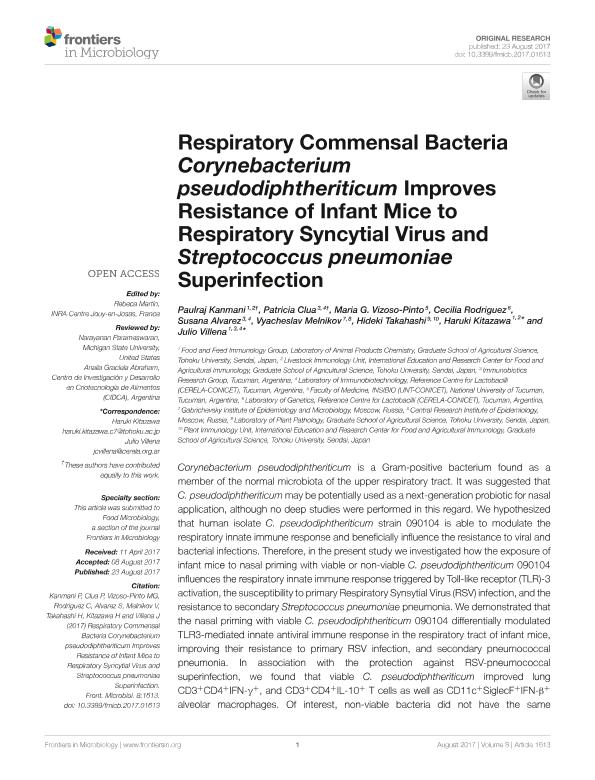Artículo
Respiratory commensal bacteria Corynebacterium pseudodiphtheriticum improves resistance of infant mice to respiratory syncytial virus and Streptococcus pneumoniae superinfection
Kanmani, Paulraj; Clua, Maria Patricia ; Vizoso Pinto, María Guadalupe
; Vizoso Pinto, María Guadalupe ; Rodriguez, Maria Cecilia
; Rodriguez, Maria Cecilia ; Alvarez, Gladis Susana
; Alvarez, Gladis Susana ; Melnikov, Vyacheslav; Takahashi, Hideki; Kitazawa, Haruki; Villena, Julio Cesar
; Melnikov, Vyacheslav; Takahashi, Hideki; Kitazawa, Haruki; Villena, Julio Cesar
 ; Vizoso Pinto, María Guadalupe
; Vizoso Pinto, María Guadalupe ; Rodriguez, Maria Cecilia
; Rodriguez, Maria Cecilia ; Alvarez, Gladis Susana
; Alvarez, Gladis Susana ; Melnikov, Vyacheslav; Takahashi, Hideki; Kitazawa, Haruki; Villena, Julio Cesar
; Melnikov, Vyacheslav; Takahashi, Hideki; Kitazawa, Haruki; Villena, Julio Cesar
Fecha de publicación:
23/08/2017
Editorial:
Frontiers Research Foundation
Revista:
Frontiers in Microbiology
ISSN:
1664-302X
e-ISSN:
1664-302X
Idioma:
Inglés
Tipo de recurso:
Artículo publicado
Clasificación temática:
Resumen
Corynebacterium pseudodiphtheriticum is a Gram-positive bacterium found as a member of the normal microbiota of the upper respiratory tract. It was suggested that C. pseudodiphtheriticum may be potentially used as a next-generation probiotic for nasal application, although no deep studies were performed in this regard. We hypothesized that human isolate C. pseudodiphtheriticum strain 090104 is able to modulate the respiratory innate immune response and beneficially influence the resistance to viral and bacterial infections. Therefore, in the present study we investigated how the exposure of infant mice to nasal priming with viable or non-viable C. pseudodiphtheriticum 090104 influences the respiratory innate immune response triggered by Toll-like receptor (TLR)-3 activation, the susceptibility to primary Respiratory Synsytial Virus (RSV) infection, and the resistance to secondary Streptococcus pneumoniae pneumonia. We demonstrated that the nasal priming with viable C. pseudodiphtheriticum 090104 differentially modulated TLR3-mediated innate antiviral immune response in the respiratory tract of infant mice, improving their resistance to primary RSV infection, and secondary pneumococcal pneumonia. In association with the protection against RSV-pneumococcal superinfection, we found that viable C. pseudodiphtheriticum improved lung CD3+ CD4+ IFN-γ+ , and CD3+ CD4+ IL-10+ T cells as well as CD11c+ SiglecF+ IFN-β+ alveolar macrophages. Of interest, non-viable bacteria did not have the same protective effect, suggesting that C. pseudodiphtheriticum colonization is needed for achieving its protective effect. In conclusion, we present evidence that nasal application of viable C. pseudodiphtheriticum could be thought as an alternative to boost defenses against RSV and secondary pneumococcal pneumonia, which should be further studied and validated in clinical trials. Due to the absence of a long-lasting immunity, re-infection with RSV throughout life is common. Thus, a possible perspective use could be a seasonal application of a nasal probiotic spray to boost respiratory innate immunity in immunocompetent subjects.
Archivos asociados
Licencia
Identificadores
Colecciones
Articulos(CERELA)
Articulos de CENTRO DE REFERENCIA PARA LACTOBACILOS (I)
Articulos de CENTRO DE REFERENCIA PARA LACTOBACILOS (I)
Citación
Kanmani, Paulraj; Clua, Maria Patricia; Vizoso Pinto, María Guadalupe; Rodriguez, Maria Cecilia; Alvarez, Gladis Susana; et al.; Respiratory commensal bacteria Corynebacterium pseudodiphtheriticum improves resistance of infant mice to respiratory syncytial virus and Streptococcus pneumoniae superinfection; Frontiers Research Foundation; Frontiers in Microbiology; 8; 23-8-2017; 1-14; 1613
Compartir
Altmétricas



